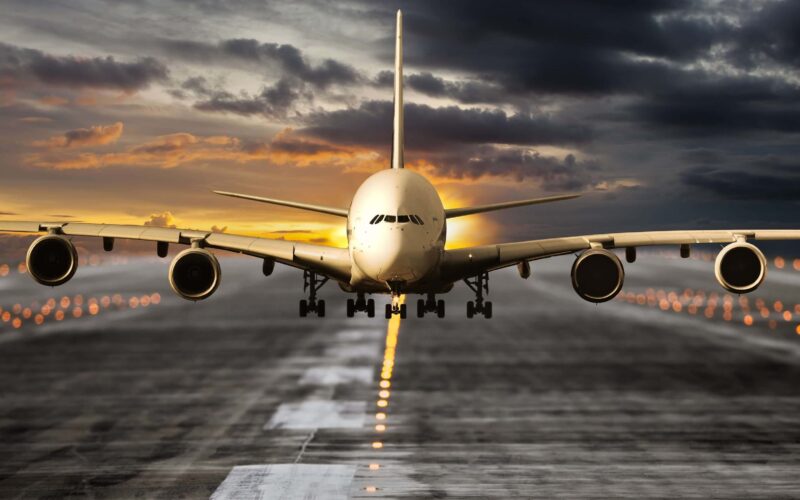On this day, 15 years ago, Singapore Airlines (SIA1) (SINGY) introduced the world’s first Airbus A380 on its inaugural service between Singapore and Sydney.
The story of the A380 dates back to 1990 when Airbus launched a project to rival Boeing in a long-haul market dominated by the 747.
During the past 15 years, the world’s largest commercial airliner has become one of the most easily recognized and favored aircraft by both passengers and the crew who fly them.
AeroTime has collated a list of 15 facts for 15 years spent flying the superjumbo.

(Credit: Milan Rademakers / Shutterstock.com)
1. A single A380 aircraft comprises around 4 million components sourced from 1500 companies across 30 countries. The airliner was constructed in sections across Germany, Spain, France, and the U.K. before being transported to the final assembly line in Toulouse, France.
2. The superjumbo is capable of carrying a maximum of 853 passengers across two full-length decks. A typical configuration for the A380 averages 545 seats, although Emirates has the densest cabin with one of its three configurations allowing for 615 passengers.
3. The quadjet is powered by either Rolls-Royce Trent 900 or Engine Alliance GB7000, the latter of which was developed in an unprecedented joint venture by major U.S. engine developers General Electric and Pratt & Whitney.
4. Alongside the passenger variant, Airbus had launched the A380F, capable of transporting 150,000kg up to 10,400km. FedEx and UPS were the largest customers each ordering 10 aircraft with options for a further 10. The orders were subsequently cancelled in 2006 and 2007.
5. The A380 boasts an enormous wingspan of 79.75m. The extra lift created allows the superjumbo to fly the same approach speed as the much smaller A320 aircraft, helping to reduce its noise footprint.
6. Like other wide-body aircraft, the A380 has crew rest areas, with one for pilots located behind the flight deck. Cabin crew rest areas are located either below the main deck accessible by steps, or at the aft of the main deck cabin.
7. With vast cabin space over two floors the A380 cabin provides some of the most luxurious offerings in the commercial market including bars, dining, and lounge areas and even an onboard shower.

(Credit : Markus Mainka / Shutterstock.com)
8. A total of 251 aircraft have been ordered with the final delivery to Emirates having taken place in December 2021. The UAE flag carrier is the largest operator of the type with 118 aircraft in its fleet. Other operators with an active A380 fleet include British Airways, Qantas, and Qatar.
9. In 2017, at the Paris Air Show, in an attempt to revive the project, Airbus unveiled the A380plus, a new design package including winglets to further save fuel, increased payloads and a cabin refit option to increase seat capacity. The rebranding ultimately failed to attract any new orders.
10. With a maximum takeoff weight of 575,000kg, the A380 sits between the Boeing 747-8 (448,000kg) and is almost as capable as the Antonov AN-225 (640,000kg).
11. Emirates operates some of the longest A380 flights, including Dubai to Los Angeles and Dubai to Auckland. Emirates suspended services to Auckland throughout the COVID-19 pandemic and is scheduled to resume A380 services on the 14,000km journey to the New Zealand capital from December 2022.
12. Conversely, Emirates also operates the shortest scheduled A380 route, flying just 1,700km to Jeddah, Saudi Arabia. The flight, which takes just under three hours, currently operates twice daily. However, the record for the shortest flight belongs to Singapore who operated between Singapore and Kuala Lumper at a distance of 296km.
13. Since its launch, the A380 is estimated to have flown over 300 million passengers on more than 800,000 flights across the globe.
14. In February 2019, it was announced that production would end by 2021. Once touted to be the future of aviation, the A380 program has given way to more popular, highly efficient twinjets such as the Boeing 777, 787 Dreamliner and Airbus A330 and A350 aircraft. Although production has ceased, the magic of the superjumbo will no doubt continue to grace the skies for many years to come.
15. If you want to own a piece of an A380, then keep an eye out for auctions. In October 2022 parts from a retired Emirates A380 aircraft, including a megaphone, crew oxygen masks, seats and even galley carts, were being auctioned off. Even the pilots’ side-sticks were up for grabs with estimates between 3,000 and 5,000 euros

(Credit: Mario Hagen / Shutterstock.com)

